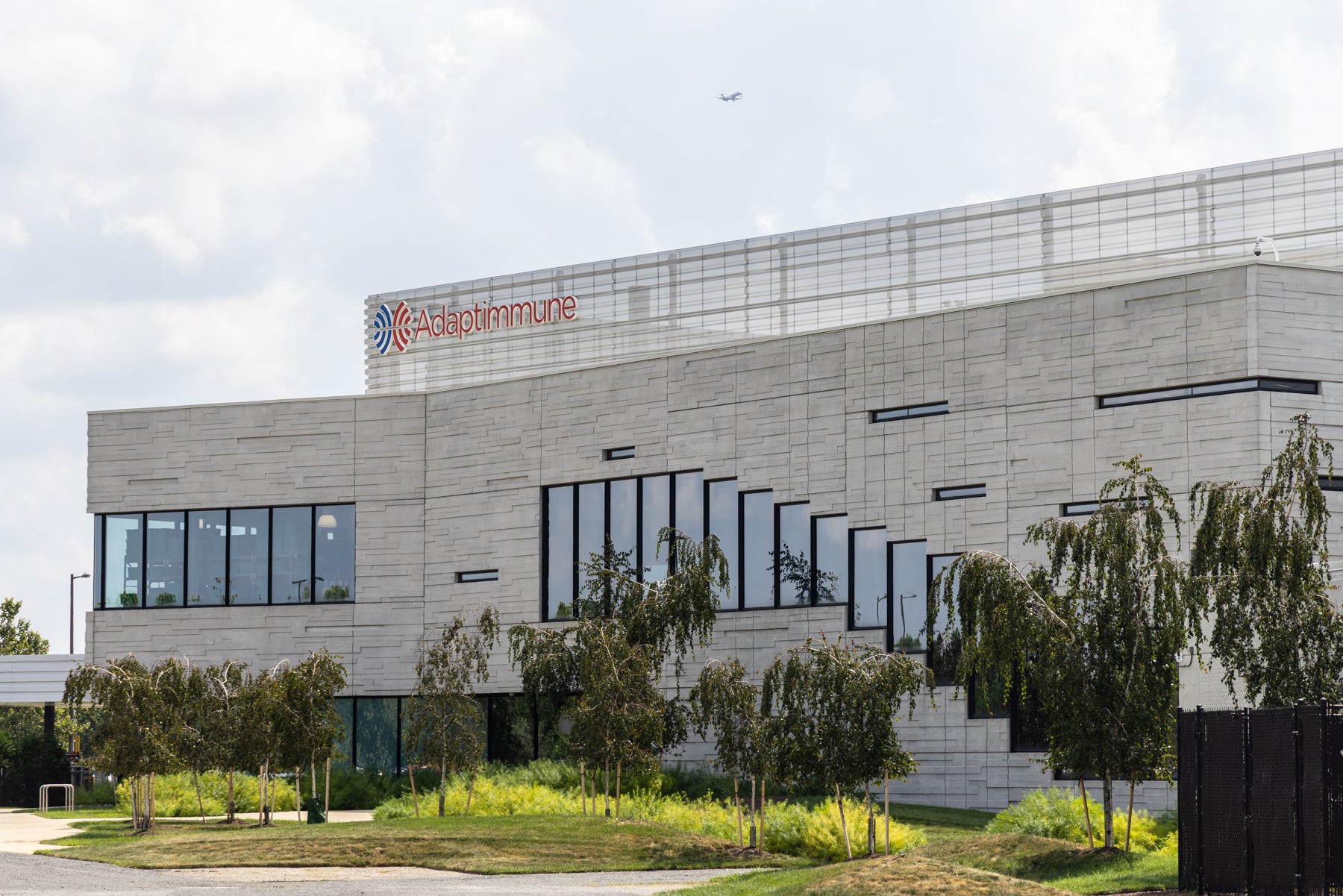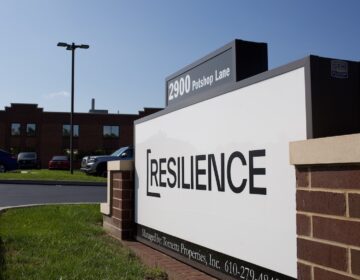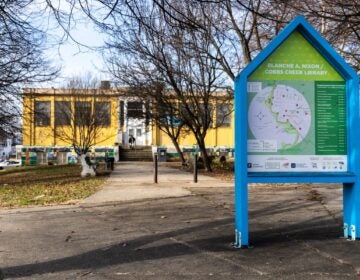Yet another homegrown biotech company is laying off Philly workers in a volatile market
Some of Philadelphia’s biotechnology companies that specialize in cell therapy shed employees in recent weeks as the industry is facing some unique headwinds.
Listen 1:18
The Navy Yard in Philadelphia, Pennsylvania (Kimberly Paynter/WHYY)
From Philly and the Pa. suburbs to South Jersey and Delaware, what would you like WHYY News to cover? Let us know!
Philadelphia’s biotechnology industry is facing a wave of uncertainty, as several unexpected setbacks have triggered hundreds of layoffs at two notable firms, raising questions about what the future holds for the city’s once-booming life sciences sector.
In recent weeks, two publicly traded companies — Century Therapeutics, based in Philadelphia, and Adaptimmune, a U.K.-based company with a U.S. hub at the Philadelphia Navy Yard — have both confirmed the layoffs.
Biotechnology industry advocates say layoffs are not uncommon in the sector as it’s known as a high-risk, high-reward proposition. That’s because the path from basic scientific research to a commercially viable business is a long road, expensive with clinical trials and regulatory hurdles, but also potentially lucrative for serial entrepreneurs and their respective investors.
But the industry has faced new challenges during President Donald Trump’s second term. The administration created the Department of Government Efficiency, or DOGE, which scrutinized federal research grants awarded to universities and other entities for basic research. Those grants fund what is oftentimes the underlying science used to commercially develop companies in biotechnology.

For example, Philadelphia’s first cell and gene therapy businesses were created after basic science researchers who had been working on scientific questions with federal research discovered that their research could help patients in the real world if they spun out a startup company. About 7,000 people were employed in the industry last year, according to a report by the Chamber of Commerce for Greater Philadelphia in 2024.
There were additional threats from the Trump administration to pull back funding from universities for noncompliance with the president’s executive orders regarding diversity, equity and inclusion efforts. Multinational corporations have built global supply chains that rely on a predictable tariff on goods when imported or exported, especially in the pharmaceutical sector.
Pennsylvania is both an importer and exporter for pharmaceutical products. In 2024, businesses operating in the state imported $1.15 billion worth of pharmaceutical products from the U.K. alone, according to the U.S. Census trade data. That same year, companies statewide exported $443 million of pharmaceutical products to the U.K., data shows.
A recent trade deal between Trump and the U.K. had not included pharmaceuticals, but a different deal with the European Union did include provisions for pharmaceutical tariffs, which one analyst predicts would cost $19 billion more for pharmaceutical companies. Since then, Trump has identified a strategy to bring down prescription drug prices by sending letters to manufacturers offering them to sell medicine directly to patients.
Biotech in Philly
Inside the Philadelphia Navy Yard, Adaptimmune opened its new U.S. headquarters in 2017. At the time, the company had 91 employees and expected to grow to 120 by the end of that year.
“The opening of this new building, which was designed to house both our US headquarters and our future state-of-the-art manufacturing facility, underscores our continued commitment to Philadelphia and the region, as well as our unwavering focus on delivering important cell therapy products to cancer patients,” said James Noble, CEO of Adaptimmune, at the time in a news release.
Noble retired as CEO in 2019.
By late July 2025, Adaptimmune announced it would be selling off several of its cell therapy divisions for $55 million after its board of directors decided on that direction after a strategic review.
The cell therapy divisions are being sold to US WorldMeds, which includes intellectual property rights. In addition to the $55 million in cash, Adaptimmune stands to earn $30 million “upon achievement of certain milestones.” US WorldMeds will be able to exclusively manufacture the cell therapies sold by Adaptimmune.
U.S. employees of Adaptimmune working on cell therapies acquired by WorldMeds will be offered jobs by the company, but it’s unclear whether those jobs would be in Philadelphia.
In December 2024, Adaptimmune had 506 employees worldwide, 384 of which were in research and development.
Adaptimmune did not respond to repeated requests for a news interview for this story.
“Adaptimmune has been at the forefront of solid tumor cell therapy and delivering groundbreaking treatments to patients for more than a decade. We were the first company to obtain a marketing authorization for an engineered TCR T-cell therapy, TECELRA, and we have a second cell therapy, lete-cel, with approval anticipated in 2026,” said Adrian Rawcliffe, CEO of Adaptimmune, in a press release. “However, given the financial situation of the Company, it is clear that securing the right strategic option was critical to maximize value for all of our stakeholders and importantly ensure our patients continue to receive TECELRA. After an extensive review of all strategic alternatives available to Adaptimmune we are convinced that this transaction represents the best path forward for Adaptimmune, our patients and stakeholders.”
Adaptimmune has been losing money, operating a net loss of $47 million during the first quarter of the year as of March, down from $48 million in 2024. Its revenue was $7.2 million compared to $5.6 million during the first quarter.
As of July 11, Century Therapeutics, which has executive offices in University City, has laid off 72 workers, 54 of whom are Pennsylvania residents.
As of December 2024, the company had 140 full-time employees and 10 part-time workers — 131 of which worked in research and development.
In July, Century Therapeutics’ board of directors approved the company to lay off about 51% of its employees. According to the company’s filings with the U.S. Securities and Exchange Commission, the layoffs cost an estimated $3.7 million, which the company attributed to “cash expenditures related to severance payments,” including some paid to executives.
The layoffs are expected to wrap up by Sept. 30, records show.
Century Therapeutics has also been losing money overall, but its finances have improved compared to last year, records show. The company reported net income of $76 million for the first quarter this year, ending in March, compared to an operating loss of $28 million for the year prior during the same quarter. Its revenue, defined as collaboration revenue as part of a deal with Bristol Myers Squibb, was $109 million during the first quarter, compared to $855,000 during the first quarter in 2024.
Century Therapeutics declined an interview for this news story and submitted a statement through a third-party spokesperson.
“We made a difficult but necessary decision to reduce our headcount by 50% including the departure of two executives. These changes are part of a broader effort to right-size the organization to focus on the programs with the highest potential for transformational value,” wrote Danielle Brown, at JPA Health on behalf of the company. “We are deeply grateful for the dedication and contributions of all affected employees and departing executives. We did not make these decisions lightly, and we are committed to supporting our team members through this transition.”
The company’s chief financial officer, Morgan Conn, and chief development officer, Adrienne Farid, both left their posts in July. They have employment agreements that are separate from the rank-and-file workforce.
In October 2024, Conn was hired as the company’s chief financial officer and earned a base salary of $470,000, in addition to a $100,000 sign-on bonus and the opportunity to hit an annual bonus plus stock options.
In May 2021, Farid was hired as the company’s chief operations officer with a base salary of $437,800 and a target bonus up to 40% of the base pay, as well.
In 2024, Farid’s base salary was $513,050, according to the SEC records. When stock awards, stock options and incentive compensation are included in the executive package, the total value of that executive package is $1.7 million.
It’s unclear whether employees of these publicly traded companies like Century Therapeutics were able to cash out when the business went public, or if individuals are holding onto the stock long-term. Often, early investors do cash out when a stock goes public.
“Their board really has an obligation to kind of maximize profit for their shareholders,” said James Fanto, professor and co-director for the Center for the Study of Business Law and Regulation at the Brooklyn Law School in New York City.
It’s also unclear whether employees who do not have executive contracts were able to cash out beyond severance agreements and earned stock holdings.
“It depends on the level of the employee and how long they’ve been there. You could have more recent employees who get paid in stock as part of their compensation but they don’t get it right away. They have to work for the company for a while,” Fanto said. “Even if they get laid off, if they work long enough and they got the stock, that’s an asset to them.”
In regard to executive compensation, the company’s perspective is that the high-value executives bring the revenue and are worth the cost.
“They put a high value on the top executives mainly for strategy. In a competitive field these are supposed to be specialists who keep the company alive or sell it if necessary,” Fanto said. “As opposed to your ordinary employee, you’ve got to give them a lot of incentive to succeed and get paid for doing things that might not be palatable, like, oh we have to downsize. A lot of severance is going to go to them [the executives] because your normal employee might not have any contractuals or a very limited one.”
Century Therapeutics has three office and laboratory office spaces in Philadelphia with leases that expire in December 2025, October 2031 and March 2034.
The company was leasing office space on the 11th floor of 25 N. 38th St. inside uCity, a biotechnology-centric office tower in University City. Its lease there is expected to expire in 2034. Its Boston leases don’t expire until 2030. Its Branchburg, New Jersey manufacturing lease for a space that spans 53,000 square feet doesn’t expire until 2037.
The company has already vacated two leases for lab and office space that were in undisclosed locations in Philadelphia, which expire in December 2025 and October 2031. The company is seeking to sublease those locations.
“No company facilities will be closed in connection with the layoff,” wrote Megan Bilson, chief people officer for Century Therapeutics, in a July letter to Mayor Cherelle Parker on file as its Worker Adjustment and Retraining Notification, or WARN Act, letter about the layoffs.
In a post on LinkedIn, Bilson shared a detailed list of employees laid off, their expertise and their titles — from scientists to biotechnology lab management.
“We recently had to say goodbye to some truly incredible colleagues at Century Therapeutics. These are brilliant scientists, dedicated operators, and creative problem-solvers — people I’ve been so proud to work alongside,” Bilson wrote. “To support their next step, we’ve created a directory of team members who are open to new opportunities. I can say without hesitation that they are the kind of people every team hopes to hire.”

Get daily updates from WHYY News!
WHYY is your source for fact-based, in-depth journalism and information. As a nonprofit organization, we rely on financial support from readers like you. Please give today.






